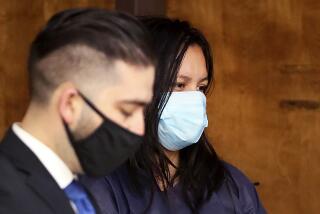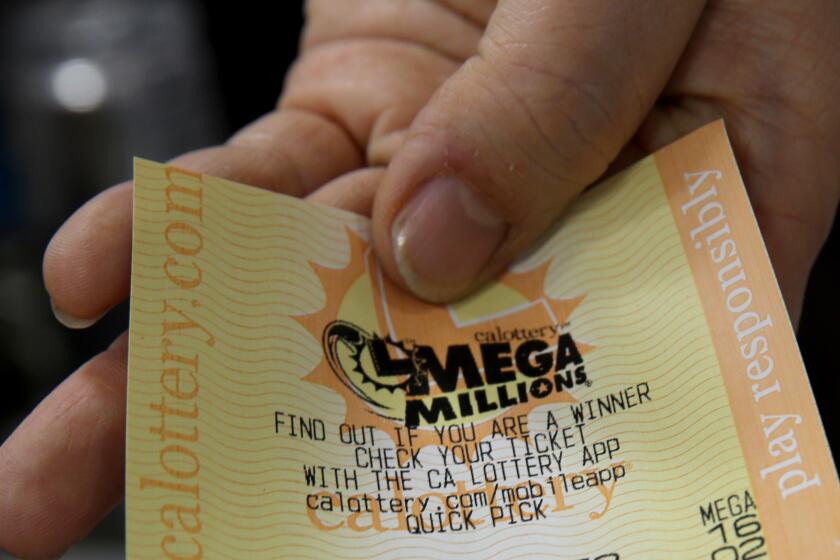Errors Mar Tenure of Reform-Minded Riverside Coroner
RIVERSIDE — Ray Carrillo vowed to restore respect and harmony when he was elected two years ago to head what was widely considered a badly managed coroner’s office.
But midway through his four-year term, the Riverside County coroner presides over an office that some say suffers from mismanagement, poor working conditions, and badly trained investigators. There have been sensational cases and blunders, including the handling of Liberace’s death and the mistaken cremation of a possible homicide victim.
A grand jury investigation is underway to examine these and other allegations that have arisen during Carrillo’s brief tenure.
“I’m not worried about it (the investigation). I’ve done nothing wrong,” said Carrillo, 59, who has been touted as a role model for the Latino community in the county. “I haven’t acted out of my range of control.”
‘A Trial by Fire’
Still, Carrillo, a heavy-set man with graying hair and beard who was a deputy coroner for 17 years, acknowledges that his time as county coroner has “been a trial by fire. Unfortunately, at this particular time, we are the laughing stock of the county because of mistakes that have been made.”
But Carrillo also has strong support, particularly from Latinos in his hometown of Indio and other cities in the Coachella Desert east of here. They say Carrillo is a genial and respected community leader who needs more time to turn the coroner’s office around.
Inside the coroner’s office--which handles more than 4,200 cases a year with a $2.3-million budget that has not increased significantly over the last five years--overworked and fatigued employees complain of a lack of leadership and morale problems so severe that mistakes are all but inevitable.
“Everybody is spending most of their time trying to cover their rear ends instead of devoting it to the job at hand,” said one deputy coroner who asked to remain anonymous for fear of retribution. “On a scale of 1 to 10, morale is about sub-4.”
Outside the office, county prosecutors have complained that autopsy reports are often late, and Sheriff’s Department homicide investigators have begun to keep an eye on the work of deputy coroners at crime scenes.
“The fear is that some piece of evidence could become tainted, damaged or lost,” said Sgt. Dan Borden. “I’m paying close attention to what their people are doing at crime scenes now. I’ve told my investigators to watch what’s going on.”
And some local funeral home directors say they have lost confidence in Carrillo’s ability to administer his office in a professional manner.
“Cripes, I’ve never seen such an uproar or discontent in an office before,” said Ed Campbell, owner of the Preston and Simons Mortuary here since 1958. “It’s just an unorganized organization.”
Now, Carrillo must prove to county administrators, staff members and the nearly 1 million residents of the county that he can make good on his campaign vow.
Looking for a Comeback
“I have to throw a 93-yard touchdown,” said Carrillo, who earns $60,000 a year in the post and came to the job without previous experience as a government administrator.
Forensic pathologists and medical examiners say mistakes can be expected in an office run by a lay coroner without previous experience as an administrator or formal training in forensic pathology.
“While a lay coroner can work effectively, in general, I think that (elected) coroners are terrible, terrible systems,” said Charles Wetli, a physician and deputy chief medical examiner for the Dade County Medical Examiner’s Office in Miami.
“An elected coroner can be anybody without formal training,” added Wetli, past president of the Forensic Council of the American Society of Clinical Pathologists. “And (coroner’s offices) are usually under funded, which means they will be too selective about which cases should be autopsied. Murders may be missed as a result, and important evidence may be lost.”
A recent survey by the U.S. Department of Health and Human Services showed that 23 states have medical examiners who are physicians, 12 states have coroners, and 16 states, including California, have both coroners and medical examiners.
Statewide Pattern
In California, only four of the 58 counties--Los Angeles, San Francisco, Santa Clara and Ventura--have medical examiners. The remaining counties have sheriffs as coroners or appointed or elected coroners such as Carrillo, reports the California Coroners Assn. in Sacramento.
Carrillo, who plans to run for a second term, has pointed an accusing finger at middle management staffers he said he “inherited from the previous administration.”
Such accusations have upset union officials charged with protecting the rights of county employees, including the 30 who work in the coroner’s office.
“I don’t think an attempt has been made to establish a rapport between the coroner and management,” said Clayton L. Neff, spokesman for the Public Employees Assn. of Riverside County. “And that has created a gulf that is up to him to correct.”
In Indio, Carrillo co-owns a Mexican restaurant operated by his wife, Lupe. He was reared in the area, where his late father, Joseph, served in the 1950s as the first Latino sheriff’s deputy in Riverside County.
Carrillo, a high school dropout who returned to school in 1972, earned a high school diploma and then an Associates of Arts degree in law enforcement from the College of the Desert in Palm Desert.
Latino Appeal
In November, a group of 40 mostly Latino residents appeared before the Riverside County Board of Supervisors to defend the man they believe has beaten the odds in a county that has seen only a handful of Latinos elected to public office.
One of those who attended the board meeting was Robert Nava, director of Chicano Student Programs at UC Riverside.
“We are saying give the man a chance. . . . This is only his second year in office and he inherited an office in disarray,” Nava said. “He’s a role model for high school and college students . . . (and) a proven county official.”
Jim O’Brien, president of the California Coroners Assn., said Carrillo’s troubles are directly related to the unusual cases that have cropped up under his reign.
“Liberace, the frozen head--that would be a nightmare,” O’Brien said. “Some counties have airplanes crash land in them. His county gets these kinds of things.”
Just before Carrillo was elected coroner, former chief deputy coroner Carl Smith was sentenced to five years probation and fined $8,500 when he pleaded guilty to one felony count of perjury and one misdemeanor count of obstruction of justice connected with a district attorney’s investigation into alleged misconduct in office.
Grand Jury Testimony
The charges against Smith resulted from his and others’ testimony in grand jury hearings “showing a scheme to cover up the deceptive and illegal falsification of job applications,” a spokesman for the district attorney’s office said at the time.
In February, 1987, four months after his election, Carrillo was in the national spotlight when he announced that he had rejected Liberace’s death certificate and ordered his body returned from Los Angeles for an autopsy to determine whether he died from AIDS.
Liberace’s personal physician, Dr. Ronald Daniels, initially gave as the cause of death heart failure brought on by subacute encephalopathy, a general term for degenerative brain disease.
The entertainer’s fans and relatives were angry that the inquiry was being conducted, and chastised Carrillo for publicizing the fact that Liberace possibly died of AIDS.
Although Carrillo was praised by county officials for following coroner’s procedures to the letter, some coroner’s investigators said they were embarrassed by Carrillo’s defensive, combative stance in front of the news media.
Center of the News
Carrillo recalled that he was under tremendous pressure to explain his position publicly. “We had 2,000 calls here from reporters around the world,” Carrillo said.
Less than a year later, Carrillo’s office made headlines again. In early January, 1988, it began to investigate the death of 83-year-old Dora Kent, whose head had been surgically removed and then frozen at a Riverside cryonics laboratory.
The Alcor Life Extension Foundation stores frozen heads and bodies in the hope that in the future they can be revived and new bodies cloned for them. Most scientists dismiss cryonics as fantasy.
Unable to find Kent’s head, the coroner’s office demanded that Alcor turn it over so an autopsy could be completed to determine whether the woman was murdered. Alcor members, including Mrs. Kent’s son, Saul Kent, 49, a co-founder of Alcor, refused, saying an autopsy would eliminate any possibility of the head being brought back to life.
The standoff became a public spectacle with Carrillo and Alcor members defending their positions at successive news conferences. The fighting ended when a Riverside County Superior Court judge barred Carrillo from thawing any of the six heads and single body preserved at the cryonics laboratory.
Charges and Denial
Eventually, the coroner’s office ruled Kent’s death a homicide caused by barbiturates and prosecutors are investigating. So far, no charges have been filed. Alcor members deny the woman was murdered.
In July, Carrillo angered union officials when he suspended two employees--supervising deputy coroner Dan Cupido and coroner’s assistant Brenda Kandjari--who were involved in the mistaken release of a possible female homicide victim from Cathedral City to a mortuary home for cremation.
The body of Julie Ann McGhee, 30, was discovered in Cathedral City on July 17 by Cathedral City Police Department officers. Carrillo said Cupido ordered Kandjari to release the body of a man to the mortuary for cremation. Kandjari, Carrillo said, failed to look inside the body bag and instead released a woman’s body. The dead woman’s family has filed a $1.5-million claim against the county.
Carrillo suspended Cupido for three days and Kandjari for five days. But a state mediator in December ordered that the suspensions be rescinded, saying it was an innocent mistake.
Union officials attacked Carrillo’s action and defended the employees, saying that the remains lacked proper identification and that existing policies in the coroner’s office lend themselves to mistakes.
Union’s Viewpoint
“What is called for now is not finger-pointing and attempts to place blame elsewhere,” union spokesman Neff wrote in a union newsletter published this month. “What needs to be done is a self-evaluation of Mr. Carrillo’s ability to administer the coroner’s office. Taking public potshots will not decrease the problems in the office.”
In October, Carrillo’s office was embarrassed again when a young couple moved into their new home near downtown Riverside and discovered plastic bags on a back yard picnic table containing human body parts.
The previous owners were deputy coroners Brad and Alendra Birdsall, who worked part time for a private pathology firm, Reference Laboratory, of Colton. Carrillo said the body parts found at the home were related to work the couple was doing for the laboratory and not related to their duties at the coroner’s office.
“I didn’t know they were cutting at home,” Carrillo said. “Had I known that I would have stopped them from doing it.”
Road to Recovery
Despite these problems, Carrillo insisted, “We are on the road to recovery. . . . My intention is to get the office back on its feet and working properly.”
In early January, he won county approval to form a new management team, hire up to seven new employees and establish a special training program for newly hired deputy coroners.
“It hasn’t been dull around here since Ray has been coroner,” said Riverside County Administrator Gary Cottrell. “But I definitely think things will improve.
“Maybe I’m a glutton for punishment, but I’m going to see this thing to the end,” Carrillo said. “The petty innuendo and back-stabbing don’t count for a hill of beans. What counts are the friends who back you up.”
More to Read
Sign up for Essential California
The most important California stories and recommendations in your inbox every morning.
You may occasionally receive promotional content from the Los Angeles Times.











